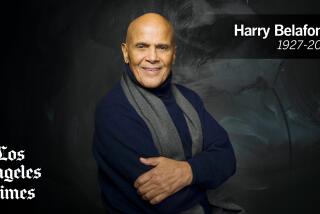Obituaries : Charles Holland; Singer Fled Bias, Found Success
- Share via
Charles Holland, a lyric tenor who sang with jazz bands in the 1930s but fled the racial prejudice of his native land to become a successful Monostatos in Mozart’s “The Magic Flute” and a well-known Nadir in Bizet’s “The Pearl Fishers,” has died in Amsterdam.
The New York Times reported Tuesday that Holland, who late in life became an artistic treasure in the United States, was 77 and died Saturday at his home in The Netherlands. The cause of death was not announced.
Holland began singing when he was only 14 but was unable to secure regular work in the operatic and concert fields because of his race. He sang for a time with Benny Carter’s and Fletcher Henderson’s jazz bands and secured a 13-week concert program on NBC radio. That brief series made him prominent enough to land roles in Marc Connelly’s drama “Green Pastures,” the 1941 film “Hullabaloo” and Virgil Thomson’s “Four Saints in Three Acts.”
He made a widely heralded New York recital debut in 1940 but quickly found that even though Marian Anderson by then was beginning to lower the racial barriers for black women operatic singers, the prejudice toward men lingered.
Eventually he moved to France where he sang on national radio and television and made his European operatic debut in “The Magic Flute” at the Paris Opera in 1954. The next year he became the first black singer to appear at the Opera-Comique.
In London, after his once bell-like tones had darkened, he sang Verdi’s “Otello” and went on to tour Europe in “Carmen,” “Boris Godunov” and Gounod’s “Faust.”
After a 20-year hiatus he returned to the United States in 1969. Conductor Dennis Russell Davies took him under his wing in the mid-1970s and in 1981, at the age of 72, Holland gave a recital at Carnegie Hall. A few years earlier, Laurie Anderson had heard him sing “O Souverain” from Massenet’s “Le Cid” that she said was the inspiration for her hit recording “O Superman.”
In 1983 he recorded an album of spirituals, “My Lord What a Mornin’ ”; the following year he appeared again in New York where “he sang from a full heart and with a conviction that need not give place to anyone,” said New York Times critic Will Crutchfield, adding that “his voice failed him at times; his spirit never.”
On Tuesday, Benny Carter recalled by telephone from New York that “the last time I saw him was in 1974. He came to my room at the Amsterdam Hilton (in New York) and sang a cappella for me.”
“ ‘I just wanted to show you I could still sing,’ ” Carter remembered Holland saying.
More to Read
The biggest entertainment stories
Get our big stories about Hollywood, film, television, music, arts, culture and more right in your inbox as soon as they publish.
You may occasionally receive promotional content from the Los Angeles Times.










